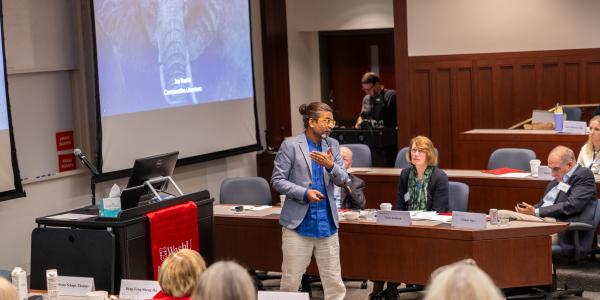Faculty and university leadership selected Wesley Wagner, a graduate student in chemistry, as the winner of the 2024 Dean’s Award for Graduate Research Excellence. Six additional graduate students were also recognized.
On Oct. 9, finalists for the 2024 Dean’s Award for Graduate Research Excellence had the opportunity to present their work to faculty and university leadership, including members of the Arts & Sciences National Council. After rounds of lightning talks, the council selected Wesley Wagner, a doctoral student in chemistry, as the prize winner.
Departments and programs across Arts & Sciences could nominate up to two graduate students for the award, which recognizes outstanding achievements in research or creative practice from the past two years.
Sophia Hayes, vice dean of graduate education and a professor of chemistry, introduced the finalists and discussed the importance of graduate students and their research. "Graduate research is one of the pillars of our university," Hayes said. "Universities offer a terrific intellectual legacy of deep scholarly achievement, and these graduate students facilitate that. They show the best pieces of Washington University and Arts & Sciences, and this next generation that we're training and sending out have fantastic skills in communication, teaching, research, and more."




Winner
Wesley Wagner, Department of Chemistry
Adviser: Michael Gross
Presentation: “Determining the 'Slopes' for Protein Misfolding"
Wagner is a PhD candidate in the Department of Chemistry. He graduated from the College of Wooster in May 2020 with a bachelor's degree in chemistry and a minor in mathematics. Under the supervision of Professor Michael Gross, he is furthering his education in protein biochemistry by utilizing various mass spectrometry methods. His current work implements mass spectrometry to study aggregating proteins and membrane proteins.
Finalists
Jack Berner, Department of Anthropology

Adviser: Michael Frachetti
Presentation: "Finding Ancient Cities in Unusual Places"
Berner is in his third year of the doctoral program in the Department of Anthropology. His research focuses on the Bronze Age archaeology of Central Asia (present-day Kazakhstan, Russia, and Uzbekistan) with a focus on the formation and abandonment of urban settlements among nomadic animal-herding societies. His research combines remote geospatial methods such as satellite image analysis, lidar, environmental modeling, and traditional archaeological fieldwork.
Kristin Emanuel, Department of English
Adviser: Anca Parvulescu
Presentation: “Creating Critically: Embodied Approaches to Poetry, Painting, and Performance”
Emanuel is a fourth-year doctoral candidate studying the relationship between poetry, visual art, and performance. Her scholarship has been honored with the Cornelison English Prize and the Dorothy Negri Prize. She is also a practicing poet and visual artist. Her latest creative work has appeared in Boston Review, Ecotone, and Shenandoah, among other journals.

Jey Sushil Jha, Department of Comparative Literature and Thought
Adviser: Anca Parvulescu
Presentation: “India Translated: Analysis of the Database of Hindi Novels in Translation from 1947-2024”
Jha is a PhD candidate on the international writers concentration in the Department of Comparative Literature and Thought. He is a bilingual writer and translator with a keen interest in South Asian and world literature. He has a diverse professional background, previously serving as a multimedia journalist and social media editor for the British Broadcasting in London and Delhi, and translating several notable works into Hindi for Penguin. He authored a memoir reflecting on his time at Jawaharlal Nehru University, where he pursued his M.A. in politics and his MPhil in international diplomacy.
Sarah Paul, Department of Psychological & Brain Sciences
Adviser: Ryan Bogdan

Presentation: “From the Genome to the Phenome: Exploring How Mental Health Genetics Manifests in Youth”
Paul’s research focuses on the mechanisms underlying risk for psychopathology and related traits and behaviors, with a particular emphasis on alcohol and substance use disorders. She is also interested in higher-order factors, such as externalizing behaviors, that explain patterns of phenotypic and genetic covariance among symptoms and disorders. To understand the relationships between putative risk factors and psychopathology outcomes, Sarah employs a variety of methods including genetically informed designs, longitudinal analysis, and agnostic data-driven approaches. Sarah is currently applying to internship programs in clinical psychology. She aims to lead a federally funded laboratory to continue this line of research with the goal of elucidating the mechanisms through which psychopathology and substance use disorders develop and identifying individual differences that influence vulnerability and resilience.
Jhan Carlos Salazar Salazar, Department of Biology

Adviser: Jonathan Losos
Presentation: “'Ain't No Mountain High Enough': Exploring Evolution Up the Mountain Slope”
Salazar earned his bachelor's degree in biology and conservation biology at Universidad Icesi in Cali, Colombia. He is currently a doctoral candidate in the Department of Biology. Before starting his degree at WashU, Salazar developed a deep interest in evolutionary biology and herpetology, focusing on the adaptive evolution of Neotropical lizards. As a doctoral candidate, his research explores the ecological and evolutionary dynamics of lizard colonization in high-elevation environments and the impact of climatic change on species diversification.
Gabriel Siegel, Department of Philosophy
Adviser: Casey O'Callaghan
Presentation: "The Vestibular Sense and Self-Consciousness"
Siegel is a doctoral candidate in the philosophy-neuroscience-psychology program who holds a master's degree in philosophy from Tufts University. He is currently a visiting student researcher at the University of California, Berkeley, and could not present his research to the National Council. His work focuses on the philosophy of mind, cognitive science, and philosophy of science. Specifically, his research aims to better understand perceptual consciousness and explanatory practices in psychology and neuroscience. He is writing a dissertation on vestibular perception and bodily awareness.
Semifinalists
Jessica Ray King, Department of Music
Gechun Lin, Department of Political Science
Takuya Okawa, Department of Physics
Aidan Schneider, Department of Biology
Sylvia Sukop, Department of Comparative Literature and Thought





